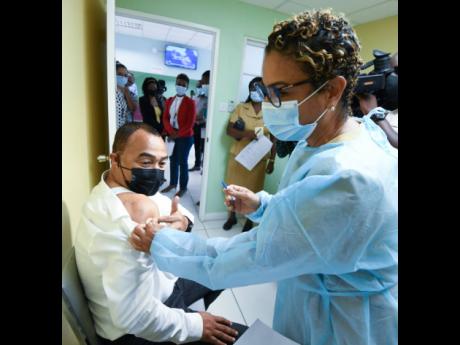VAX HOPE - Jamaica won’t be sharing COVID jabs with CARICOM, says Tufton; first shipment expected next week
As Jamaica gears up to receive a gift of 50,000 AstraZeneca vaccines from India next week, Health and Wellness Minister Dr Christopher Tufton has said that unlike Barbados, the island will not be sharing any doses with Caribbean neighbours as the...
As Jamaica gears up to receive a gift of 50,000 AstraZeneca vaccines from India next week, Health and Wellness Minister Dr Christopher Tufton has said that unlike Barbados, the island will not be sharing any doses with Caribbean neighbours as the Government seeks to finally get a start on its plan to inoculate two million citizens over the next 12 months.
Earlier this month, Barbados received a gift of 50,000 vaccines (100,000 doses) from India and has been sharing them with other CARICOM states. Jamaica does not have that luxury, Tufton pointed out yesterday.
“Unfortunately, we don’t have the numbers right now to give, as much as how we have benefited from a gift in this instance. The population that we have and the challenges of the surge and the need to start the process, the generous gift that we have had from India, expected next week, will have to be utilised in lessening our vulnerability,” said Tufton.
He added that Jamaica may have additional vaccines arriving soon based on current discussions as “there are one or two other options, including COVAX”, referring to a global initiative seeking to ensure poorer countries are not shut out from the vaccine market.
Tufton said that with the Pfizer-BioNTech vaccine being cleared by US Food and Drug Administration, the high-efficacy COVID-19 jab is back on the table as an option for Jamaica.
“Right now, we would be anxious to get any vaccine that is available that meets the efficacy test, and price, while important, is not as important as accessing the vaccines, so it is not that we want to spend more money for fewer vaccines, it’s really is a function of trying to find vaccines that are available that meet the quality standard,” he said, explaining that Jamaica was prepared to be flexible on prices because of the high demand.
“The more we can get would be the better for us,” Tufton told The Gleaner.
The Pfizer vaccine is said to cost providers US$20 per dose, while the Oxford-AstraZeneca jab costs roughly US$4 per dose.
The batch of vaccines from India, which Tufton first announced last week, will be aimed at inoculating front-line workers.
“Front-line workers start with those who deal directly with the public on COVID matters. Anyone who comes into contact with a potential COVID patient, whether to confirm or to treat, must be given priority. That’s the policy,” he said, noting that there were approximately 25,000 medical staff in both the public and private sectors at the top of the list for inoculation. Each will require two jabs – a priming dose and a booster shot.
“Beyond that, you have to go to the institutions like infirmaries,” he said, admitting that he was uncertain of the number of residents and caregivers in those facilities.
He, however, pointed out that the vulnerable population of persons 60 and over with comorbidities stood between 500,000 and 600,000.
Following suit, the Jamaica Constabulary Force and Jamaica Defence Force will be next in line to be inoculated, based on priority, as more vaccines become available.
Yesterday, Tufton oversaw a vaccination simulation exercise at The Good Samaritan Inn in downtown Kingston, one of 74 designated vaccination sites across the country.
The process will start with sanitisation and temperature checks before staff verify appointments. Persons will then be given a health education briefing on the vaccine before proceeding to registration.
Before getting the jab, the administrator will conduct a cautionary screening test for comorbidities and after the vaccine is administered, patients will be escorted to the observation room, where they are required to spend 20 minutes to rule out any immediate adverse effects.
Completing all these steps warrants the vaccination card to be stamped and the second appointment scheduled.
The vaccination of front-line workers will run as a pilot to ensure optimum processing capacity before more people begin to get vaccinated. Though an additional 550 health- care personnel were trained to administer the vaccine, the first roll-out will determine if the health facilities will need to train more people.

